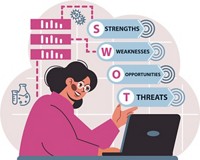Advertisement
Grab your lab coat. Let's get started
Welcome!
Welcome!
Create an account below to get 6 C&EN articles per month, receive newsletters and more - all free.
It seems this is your first time logging in online. Please enter the following information to continue.
As an ACS member you automatically get access to this site. All we need is few more details to create your reading experience.
Not you? Sign in with a different account.
Not you? Sign in with a different account.
ERROR 1
ERROR 1
ERROR 2
ERROR 2
ERROR 2
ERROR 2
ERROR 2
Password and Confirm password must match.
If you have an ACS member number, please enter it here so we can link this account to your membership. (optional)
ERROR 2
ACS values your privacy. By submitting your information, you are gaining access to C&EN and subscribing to our weekly newsletter. We use the information you provide to make your reading experience better, and we will never sell your data to third party members.
Business
How To Make Bad Decisions
by Brought to you by the ACS Career Navigator
October 6, 2014
| A version of this story appeared in
Volume 92, Issue 40

You make many decisions every day—from little ones like what to eat for lunch, to big ones like which work projects to advance and which ones to abandon. You always try to make the best decision possible, but there are many ways to go wrong. It’s important to be aware of possible pitfalls so you can avoid them, especially with major decisions. Some easy ways to make bad decisions—and ways to dodge them—are described below.
BE LAZY. As a scientist, you know how to conduct a research project, but outside the laboratory, you might sometimes forget to apply that skill and self-discipline to other types of problems. Yet this might be the easiest pitfall to avoid because of your training. By double-checking the facts, confirming assumptions, and gathering thoughtful input from relevant personnel (also called stakeholders), you can ensure that any decision is based on a solid foundation.
DON’T EXPECT THE UNEXPECTED. Although you may hope for the best, it’s prudent to consider the worst in your planning. Spend some time thinking about the potential consequences if things don’t go as expected; that way, you can identify potential problems and create contingency plans. Also, pondering which options would be best if things go wrong may help eliminate some options. For example, option A may be acceptable no matter what happens, while option B may be ideal if everything goes perfectly but disastrous if a particular condition changes.
DON’T DECIDE. You need to gather all the necessary information, but you don’t need to gather unnecessary information. Analysis paralysis occurs when you spend too much time considering the options and possibilities but neglect to actually make a decision. Without a firm deadline (or even with one), it’s tempting to keep collecting data and asking opinions, hoping that a new fact will make the right path obvious. At some point, you just have to make the decision and deal with the consequences.
DON’T BE ADAPTABLE. Like the proverbial frog-in-a-saucepan that boils to death because it doesn’t notice the water is slowly getting warmer, sometimes you might not realize that a gradual change has significantly altered the landscape, so something that worked well is no longer best or even appropriate. Taking a hard look at the validity of underlying assumptions, both explicit and implicit, as well as related trends, ensures that your decisions are relevant to the way things are now, not the way they used to be.
WORK IN A VACUUM. Making the best decision in a given situation depends on your definition of “best.” Is it best for you, this project, this department, or the company overall? Is it the best short-term solution or the best long-term solution? To balance competing priorities, you need to assess the relative importance of each—not only to you and your department but to management and to the organization as a whole.
Although there are many ways to make a wrong decision, the only way to make the right one is to make sure you have as complete and accurate information as possible, weigh your options, and then choose the one that most closely matches your ideal result.
Get Involved In The Discussion. The ACS Career Tips column is published the first week of every month in C&EN. Post your comments, follow the discussion, and suggest topics for future columns in the Career Development section of the ACS Network (www.acs.org/network-careers).






Join the conversation
Contact the reporter
Submit a Letter to the Editor for publication
Engage with us on Twitter